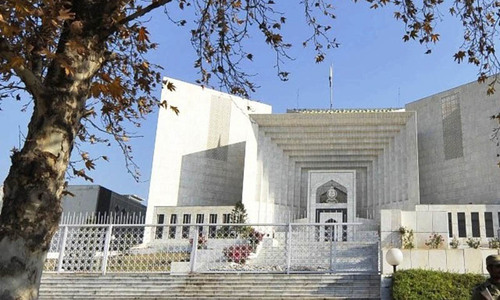ISLAMABAD: Senate Chairman Sadiq Sanjrani and National Assembly Speaker Asad Qaiser on Monday discussed the issue of appointment of members of the Election Commission of Pakistan (ECP) and decided to call another meeting on Tuesday in the presence of the law minister and the attorney general.
The meeting was held at the Parliament House “in the wake of the last month’s order of the Islamabad High Court” regarding the controversial appointment of ECP members, said a handout issued by the National Assembly Secretariat.
It was “resolved during the meeting that the issue in question would be discussed and determined in accordance with the Constitution of Islamic Republic of Pakistan and rules of procedure of parliamentary committees”, added the handout.
It said the NA speaker and the Senate chairman had decided to meet again on Tuesday in the presence of federal Minister for Law and Justice Barrister Farogh Naseem, Parliamentary Affairs Minister Azam Khan Swati and Attorney General Anwar Mansoor Khan.
Sources said the law minister and the attorney general had been asked to suggest a way out to resolve the controversy that had been lingering on since the retirement of Abdul Ghaffar Soomro and retired Justice Shakeel Baloch, ECP members from Sindh and Balochistan, respectively, in January.
Agree to resolve matter in accordance with Constitution and rules of procedure
Under the law, their replacements were to be appointed within 45 days.
Under the Constitution, a consultation between the prime minister and the opposition leader is required for the appointment of ECP members as well as the chief election commissioner.
After failure of Prime Minister Imran Khan and Leader of the Opposition in the National Assembly Shahbaz Sharif to reach a consensus on the names, the matter was referred to the bi-partisan parliamentary committee on appointment of ECP members, but it also failed to reach a consensus.
President Alvi, using his ‘discretionary power’, then appointed Khalid Mehmood Siddiqui from Sindh and Munir Ahmed Kakar from Balochistan on Aug 22 against the two vacant positions, prompting a strong protest by opposition parties.
The controversy deepened when in an unprecedented move, CEC retired Justice Sardar Mohammad Raza refused to administer the oath to the two members, terming their appointments unconstitutional.
The president’s act was challenged before the IHC by Nisar Ahmed Cheema and Murtaza Javed Abbasi, the two opposition lawmakers from the Pakistan Muslim League (PML-N) and members of the parliamentary committee on appointments of ECP members. Besides, another petition against the appointments was filed by lawyer Jahangir Jadoon.
The IHC in its Oct 15 order, while referring the case to parliament for deciding the controversy, had in a subtle way reminded the government that a presidential order could not overrule constitutional provisions while violation of the Constitution was tantamount to treason.
The petitioners had alleged that the president had bypassed the constitutional provisions.
The petitioners said there was no constitutional provision that allowed the president to appoint Mr Siddiqui and Mr Kakar by invoking his discretionary powers. They added that after the passage of the 18th Constitution Amendment, the president had lost his discretion to appoint the ECP members.
The government’s lawyers had conceded before the court that “the prime minister and the leader of the opposition could not form a consensus and, therefore, the names were forwarded to the parliamentary committee as provided under sub-article 2A of Article 213 of the Constitution”.
IHC Chief Justice Athar Minallah had observed that the two ECP members “have not been appointed in the manner prescribed under Article 213 read with Article 218 of the Constitution of the Islamic Republic of Pakistan 1973”.
The parliamentary committee constituted by the NA speaker also could not confirm the names from the separate lists sent by the prime minister and the opposition leader.
The IHC chief justice had observed that parliament represented the people of Pakistan through their chosen representatives. Both the upper and lower houses, therefore, were expected to resolve political issues through dialogue and in accordance with the democratic principles so that involving the courts in such matters could be avoided and the time of the judiciary was used for deciding pending litigation.
Published in Dawn, October 29th, 2019















































Dear visitor, the comments section is undergoing an overhaul and will return soon.